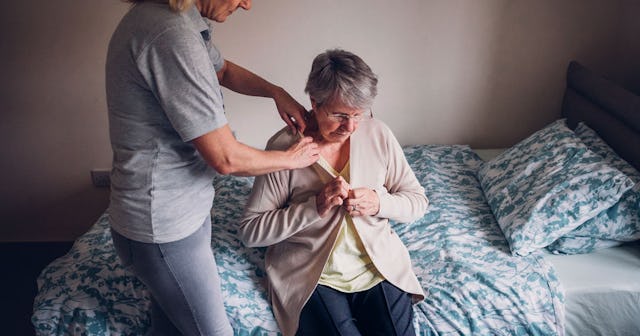This Is What America's Caretakers Are Facing Right Now

Once upon a time, in 2019, my sister and I were caretakers to my Mom. You see, she’d just come through a several months inpatient stay at a hospital battling cancer and subsequent infection that nearly cost her, her life. In rehab, she learned to walk, eat, and drink all over again. Yes, there was nursing staff and physical therapists on call at the facility, but the bulk of everything in between fell on our family’s shoulders.
I remember the first time she had to go back to her oncologist’s office from her rehab facility. It was two counties away (about an hour trip), and she was still using a wheelchair. Our family didn’t have an accessible vehicle for her to travel in, and I had no idea how we would get her there. I asked the facility social worker if there was a transportation service we could use. He told me they only drove within county lines. Sorry, he said, maybe you can google it.
Overwhelmed, couldn’t even begin to cover how we felt in those early days. Between taking care of my Mom, working, and then coming home to my own family, I felt stressed to the max. And, of course, this was all pre-covid. Caretakers now are facing a whole other set of challenges. How do they keep their loved ones safe? How are they able to continue to meet their needs in an ever-changing situation? If they spend most of their time caring for others when can they find time and energy to practice self-care?
What Caretakers Are Facing
Goodboy Picture Company/Getty
Remember when the pandemic first hit, when we only took trips out of the house for doctor’s appointments and medication runs? Remember when we were wiping down our groceries? Now imagine doing that twice. Once for for yourself, and again for the person you care for. This lifestyle isn’t an anomaly. There are millions of unpaid caretakers, whether they’re caring for a grandparent, a parent, a spouse, or their own children. In fact, according to an article on Vox.com, it’s estimated that 47.9 million (almost 20%) Americans double as unpaid caretakers of loved ones.
Not only is it physically exhausting, but it’s mentally draining too. During the beginning of the pandemic, every move was calculated. Some caretakers relied on in-home care services to take care of their loved ones, but how safe was that really? Physical therapists or traveling nurses going from place to place were being careful. But bringing them into a space with a vulnerable person was a risk. Were they asymptomatic? Or had they accidentally brought Covid with them from another space?
There were (are) just too many unknowns to keep relying on outside help the way they had been before. The stats also show that of those 47.9 million people, 61% are women. Surprise, surprise, since we already know women have been disproportionately impacted by the pandemic. Between the physical labor of caretaking, and the emotional and mental drain, there is often not much left for caretakers to care for themselves.
For caretakers, taking care of their mental health is low on the laundry list of things they have to get through on any given day. It should never have been this way, but it cannot continue. That same article cites, “Nearly half of family caregivers reported psychological distress” which could include anxiety and depression symptoms, as well as suicidal ideation.
Managing mental health through the pandemic has been hard for everyone. But the challenges caretakers face is on another level. Imagine, if people would just do what’s been asked of them, we might be on the other side of things. And by people, I’m talking about anti-vaxx assholes. They are too busy claiming their rights are being trampled on, while forgetting how their choice to not be safe impacts the most vulnerable.
How We Can Help Caretakers
FG Trade/Getty
Caretakers aren’t asking to be paid. They aren’t asking for gold stars or accolades for taking care of their loved one’s. Hell, they might not even come straight out and ask for this. But I’m asking for them: Get your damn vaccine and mask up. Literally, that’s all folks. These aren’t big asks.
When everyone is being safe and responsible, you help caretakers feel like the vulnerable people in their life have a fighting chance. Caretakers feeling safe enough to bring people they care for out to get some fresh air shouldn’t be this hard.
If you’ve never been a caretaker before, you might not get it. But y’all, the responsibility is overwhelming. So let’s do what we can to support caregivers. It’s time to stop failing them, and aid in the selfless work they do. If you know someone who is a caregiver, maybe support them with small acts of kindness. Help them with little things outside of the caregiving duties.
Can you help bring their kids to and from events? Maybe cook up (or take-out) some dinner for them so it’s one less thing for them to worry about. At a minimum, wear your mask in public spaces. Get the vaccine if you haven’t already. It’s absolutely the least you can do. We’re all in this together, aren’t we?
This article was originally published on